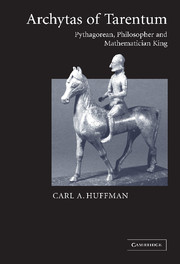Book contents
- Frontmatter
- Contents
- List of figures
- Preface
- PART ONE INTRODUCTORY ESSAYS
- I Life, writings and reception
- II The philosophy of Archytas
- III The authenticity question
- PART TWO GENUINE FRAGMENTS
- PART THREE GENUINE TESTIMONIA
- Appendix 1 Spurious writings and testimonia
- Appendix 2 Archytas' name
- Bibliography
- Select index of Greek words and phrases
- Index locorum
- General index
I - Life, writings and reception
Published online by Cambridge University Press: 04 August 2010
- Frontmatter
- Contents
- List of figures
- Preface
- PART ONE INTRODUCTORY ESSAYS
- I Life, writings and reception
- II The philosophy of Archytas
- III The authenticity question
- PART TWO GENUINE FRAGMENTS
- PART THREE GENUINE TESTIMONIA
- Appendix 1 Spurious writings and testimonia
- Appendix 2 Archytas' name
- Bibliography
- Select index of Greek words and phrases
- Index locorum
- General index
Summary
SOURCES
(The original texts and translations of the testimonia for Archytas' life are found in Part Three, Section One)
Archytas did not live the life of a philosophical recluse. He was the leader of one of the most powerful Greek city-states in the first half of the fourth century bc. Unfortunately he is similar to most important Greek intellectuals of the fifth and fourth centuries bc, in that we have extremely little reliable information about his activities. This dearth of information is all the more frustrating since we know that Aristoxenus wrote a biography of Archytas, not long after his death (A9). Two themes bulk large in the bits of evidence that do survive from that biography and from other evidence for Archytas' life. First, there is Archytas' connection to Plato, which, as we will see, was more controversial in antiquity than in most modern scholarship. The Platonic Seventh Letter, whose authenticity continues to be debated, portrays Archytas as saving Plato from likely death, when Plato was visiting the tyrant Dionysius II at Syracuse in 361 bc. Second, for Aristoxenus, Archytas is the paradigm of a successful leader. Elected general (stratēgos) repeatedly, he was never defeated in battle; as a virtuous, kindly and democratic ruler, he played a significant role in the great prosperity of his native Tarentum, located on the heel of southern Italy.
- Type
- Chapter
- Information
- Archytas of TarentumPythagorean, Philosopher and Mathematician King, pp. 3 - 43Publisher: Cambridge University PressPrint publication year: 2005

